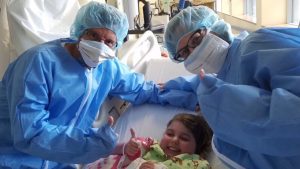This page, establisehd in loving memory of Marisa Tufaro, the namesake of our nonprofit, is meant to be a resource for transplant recipients and caregivers who have been diagnosed with post-transplant lymphoproliferative disorder (PTLD).
 The information is believed to be the most current about PTLD and is based on material from the Leukemia & Lymphoma Society, the National Organization for Rare Disorders and Be The Match.
The information is believed to be the most current about PTLD and is based on material from the Leukemia & Lymphoma Society, the National Organization for Rare Disorders and Be The Match.
WATCH: National Organization for Rare Disorders’ PTLD video
The material contained on this page does not constitute medical advice and is intended solely for informational purposes.
On this page, readers can also find synopses with accompanying links and videos to inspirational stories of organ and bone marrow transplant recipients who have won valiant battles with PTLD, as well as contact information for organizations that can provide support to those diagnosed with PTLD and their families.
Those wishing to share an inspirational story or a pertinent link that visitors to this page may find beneficial are invited to do so in the comment section below.
Marisa’s parents, Greg and Cyndi, participated in a first-of-its kind patient and caregiver advisory board meeting in February 2019 in Houston, during which a dynamic group of survivors of PTLD and family members who lost loved ones to the rare form of blood cancer convened with the hope that their stories will impact diagnosis and treatment of the disease.
The meeting was held in conjunction with a national conference known as the Transplantation and Cellular Therapy Meeting of the American Society for Blood and Marrow Transplantation (ASBMT) and Center for International Blood and Marrow Transplant Research.
WHAT IS PTLD
According to the National Organization for Rare Disorders, post-transplant lymphoproliferative disorder (PTLD) is a rare but well-known complication of solid organ transplants and hematopoietic stem cell transplantation.
 PTLD is classified as a lymphoma, a group of related cancers that affect the lymphatic system.
PTLD is classified as a lymphoma, a group of related cancers that affect the lymphatic system.
PTLD is related to the Epstein-Barr virus (EBV) and immunosuppression therapy.
PTLD is characterized by the overproduction and spread of too many white blood cells (lymphocytes).
For detailed information about PTLD, please visit the National Organization for Rare Disorders’ database, which delves into an array of topics including signs and symptoms, causes, affected populations, related disorders, diagnosis, clinical testing, standard therapies, investigational therapies and more.
Thomas M. Habermann, MD, Division of Hematology, Department of Medicine, Mayo Clinic helped prepare the aforementioned.
SIGNS AND SYMPTOMS OF PTLD
According to the Leukemia & Lymphoma Society, it is paramount for patients to immediately report any symptoms to their transplant team, for early diagnosis gives patients the best chance for successful treatment.
 Common symptoms of PTLD can vary from patient to patient. They include a general feeling of discomfort, illness or uneasiness, fatigue, fever, decreased appetite, unintentional weight loss, night sweats, infectious mononucleosis symptoms such as sore throat or swollen glands in the neck, and/or swelling of the lymph nodes.
Common symptoms of PTLD can vary from patient to patient. They include a general feeling of discomfort, illness or uneasiness, fatigue, fever, decreased appetite, unintentional weight loss, night sweats, infectious mononucleosis symptoms such as sore throat or swollen glands in the neck, and/or swelling of the lymph nodes.
A patient may feel a swollen lump in the neck, armpit or groin. These lumps are swollen lymph nodes where abnormal B lymphocytes have collected. Lymph nodes can become enlarged in parts deeper inside the body that a patient may not be able to feel. These swollen lymph nodes can only be detected through imaging tests such as computed tomography (CT) scans or magnetic resonance imaging (MRI) scans.
Occasionally, PTLDs start in a site other than the lymph nodes such as a bone, a lung, the gastrointestinal (GI) tract or the skin. In these circumstances, patients may experience symptoms associated with that specific site.
With support from Atara Biotherapeutics, the Leukemia & Lymphoma Society has created a comprehensive and reader-friendly fact sheet about PTLD with further information on signs and symptoms, as well as insight into causes, risk factors, diagnosis, classification, prevention, treatments, treatments under investigation, patient outcomes and more.
WHAT IS THE INCIDENCE OF PTLD
According to the Leukemia & Lymphoma Society, t he incidence of PTLD following stem cell transplantation depends on the donor type, with an overall incidence of about 3 percent. The vast majority of PTLDs in stem cell transplant patients occur early, within 6 to 12 months of transplant when the immune system is still very weak.
he incidence of PTLD following stem cell transplantation depends on the donor type, with an overall incidence of about 3 percent. The vast majority of PTLDs in stem cell transplant patients occur early, within 6 to 12 months of transplant when the immune system is still very weak.
The incidence of PTLDs following solid organ transplant depends on the transplanted organ. In the adult population, recipients of kidney transplants have the lowest incidence of PTLDs (0.8 to 2.5 percent), followed by recipients of pancreatic transplants (0.5 to 5.0 percent), liver transplants (1.0 to 5.5 percent), heart transplants (2.0 to 8.0 percent), lung transplants (3.0 to 10.0 percent), and multi-organ and intestinal transplants (about 20 percent).
WHAT ARE TREATMENTS FOR PTLD
The Food and Drug Administration (FDA) has yet to approve any therapies to treat PTLD, according to the Leukemia & Lymphoma Society.
According to Be The Match, a nonprofit under the auspices of the National Marrow Donor Program dedicated to helping patients receive life-saving transplants, standard treatments for PTLD typically include:
A reduction of immunosuppression to see if the patient’s own immune system can fight the PTLD.
The administration of Rituximab (Rituxan) to target the patient’s B cells.
The use of aggressive chemotherapy.
The use of other treatments in development that are available through clinical trials.
Clinical trials are available for patients who have undergone solid organ transplants and hematopoietic stem cell transplantation.
In the video above, which the Rare and Genetic Disease Network recently posted, Mohamad Mohty, MD, PhD, Professor of Hematology at Sorbonne University and Head of the Hematology and Cellular Therapy Department at the Saint Antoine Hospital in Paris, discusses PTLD and its treatments including an immunotherapy in Phase 3 studies called tabelecleucel (tab-cel).
ADDITIONAL INFORMATION ON PTLD
Visit Leukemia & Lymphoma Society
Visit National Organization for Rare Disorders
Visit OncoLink.org
Visit LymphomaAction.org
Visit CanadianCancerSociety.ca
Visit National Kidney Foundation
STORIES OF INSPIRATION
BRONCO REESE
Bronco Reese, a 12-year-old born with four cardiac defects who underwent a successful heart transplant in April 2015, was diagnosed five months later with PTLD.
After five months of chemotherapy treatment, Bronco’s cancer was declared to be in remission.
In 2018, the Atlanta Braves honored Bronco as a community hero for the outstanding work of Bronco’s Benevolent Foundation, a nonprofit established in his name, and for Bronco being an inspiration to countless others.
BRANTLEY FRAZIER
Brantley Frazier, the son of professional fighter Justin Frazier, was born with hypoplastic left heart syndrome, the same congenital cardiac defect with which Marisa was diagnosed. Brantley underwent a successful heart transplant when he was just two weeks old, making him at the time reportedly the world’s second youngest heart transplant recipient. Brantley was subsequently diagnosed with PTLD, which chemotherapy successfully treated. Brantley is now 6 years old. “He’s by far the smartest six-year-old you’ll ever see,” Brantley’s father, Justin Frazier, said. “He will argue and carry on like you wouldn’t believe.”
AIDEN SAUNDERS
A year after undergoing an 11-hour heart transplant surgery and six months after being diagnosed with PTLD, 13-year-old Aiden Saunders was swimming competitively for his high school swim team in Michigan.
CASHLIN IZZARD
Cashlin Izzard, a 9-year-old who had a heart transplant at the age of 2, was diagnosed in 2018 with PTLD. With his cancer in remission in March 2019, Cashlin was playing Little League baseball.
BRIANNA BARKER
Penn State University student Brianna Barker, diagnosed with PTLD in January 2018, several years after undergoing a heart transplant, returned to school and served as photography captain for THON 2019, the college’s annual student-run philanthropy committed to enhancing the lives of children and families impacted by childhood cancer.
SKYE SAVREN-McCORMICK
In 2018, Skye Savren-McCormick, a 3-year-old whose PTLD is in remission, served as a flower girl at the wedding of Hayden Hatfield Ryals, the former stranger whose bone marrow was a perfect match when Skye was in need of a transplant.
Skye was diagnosed before her first birthday with juvenile myelomonacytic leukemia, a rare form of cancer that required blood and platelet transfusions almost daily and left her hospitalized for 10 months because of complications while getting treatment. Following her bone marrow transplant, Skye developed PTLD, which chemotherapy successfully treated. “She’s a fighter, and she is full of spunk, and she just has the best attitude, and I think everybody could learn something from this 3-year old,” Ryals told CNN.
BEN GOLDEN
Ben Golden was diagnosed at birth with dilated cardiomyopathy, a condition in which the heart is enlarged and cannot effectively pump blood. A month after he was born, Ben needed a heart transplant.
“He was so sick that we never got him out of the hospital,” said F. Bennett Pearce, medical director, heart transplant and heart failure at Alabama Children’s Hospital’s Bruno Pediatric Heart Center. “We weren’t going to get him out of the hospital without a heart transplant.”
Two years after his successful heart transplant, Ben developed PTLD, which Kimberly Whelan, MD, MSPH at Alabama Center for Childhood Cancer and Blood Disorders said “turned out to be a form of cancer that we see in our transplant patients.” After multiple rounds of chemotherapy, Ben’s cancer was beaten into remission. His heart continues to work flawlessly and is an all-star on his Little League baseball team. “Most people would never know there was anything wrong with him,” said Ben’s father, Isaac Peterson. “You would have to tell people that he had a heart transplant and beat cancer because he’s as rambunctious and as wide-open as any six-year-old can be.”
MORE STORIES OF INSPIRATION
READ: Ola developed PTLD after receiving a kidney and heart transplant
READ: Ayden developed PTLD after a kidney transplant
READ: A former star lacrosse player triumphs over PTLD
MARISA’S STORY
Marisa, who died at the age of 13, was born with hypoplastic left-heart syndrome. The complex cardiac defect required six open-heart surgeries. After her sixth surgery, Marisa developed two life-threatening conditions known as protein-losing enteropathy and plastic bronchitis, which necessitated a heart transplant.
 The transplant was supposed to extend Marisa’s life, but tragically cut it short when a postoperative complication developed into PTLD. After radiation and chemotherapy treatments failed to thwart the relentless onslaught of the aggressive disease, which riddled her brain and body, Marisa succumbed to her illness following a valiant battle on January 30, 2017.
The transplant was supposed to extend Marisa’s life, but tragically cut it short when a postoperative complication developed into PTLD. After radiation and chemotherapy treatments failed to thwart the relentless onslaught of the aggressive disease, which riddled her brain and body, Marisa succumbed to her illness following a valiant battle on January 30, 2017.
Marisa’s case of PTLD, according to the medical director of heart failure, cardiomyopathy and cardiac transplantation at one of the nation’s leading children’s hospitals, was “a very grave form” that “occurred very early (three months) after transplant and was very widespread.”
Despite being hospitalized for more than two years and maintaining hundreds of doctor’s appointments, Marisa lived a vibrant life that inspired.
The Marisa Tufaro Foundation, which assists pediatric patients and other children in need throughout the greater Middlesex County (N.J.) area, is a fitting way to honor Marisa and keep alive her indomitable spirit.
Through the generosity of others, who have donated or participated in fundraising events, The Marisa Tufaro Foundation, since its inception on July 30, 2017, has already made a profound impact, donating nearly $200,000 and spearheading multiple community initiatives to assist pediatric patients and other children in need.
SUPPORT FOR PTLD PATIENTS
American Cancer Society, Inc.
250 Williams NW St
Ste 6000
Atlanta, GA 30303 USA
Phone: (404) 320-3333
Toll-free: (800) 227-2345
Website: http://www.cancer.org
Leukemia & Lymphoma Society
3 International Drive
Suite 200
Rye Brook, NY 10573
Phone: (914) 949-5213
Toll-free: (800) 955-4572
Email: infocenter@LLS.org
Website: http://www.LLS.org
National Cancer Institute
6116 Executive Blvd Suite 300
Bethesda, MD 20892-8322 USA
Phone: (301) 435-3848
Toll-free: (800) 422-6237
Email: cancergovstaff@mail.nih.gov
Website: http://www.cancer.gov

